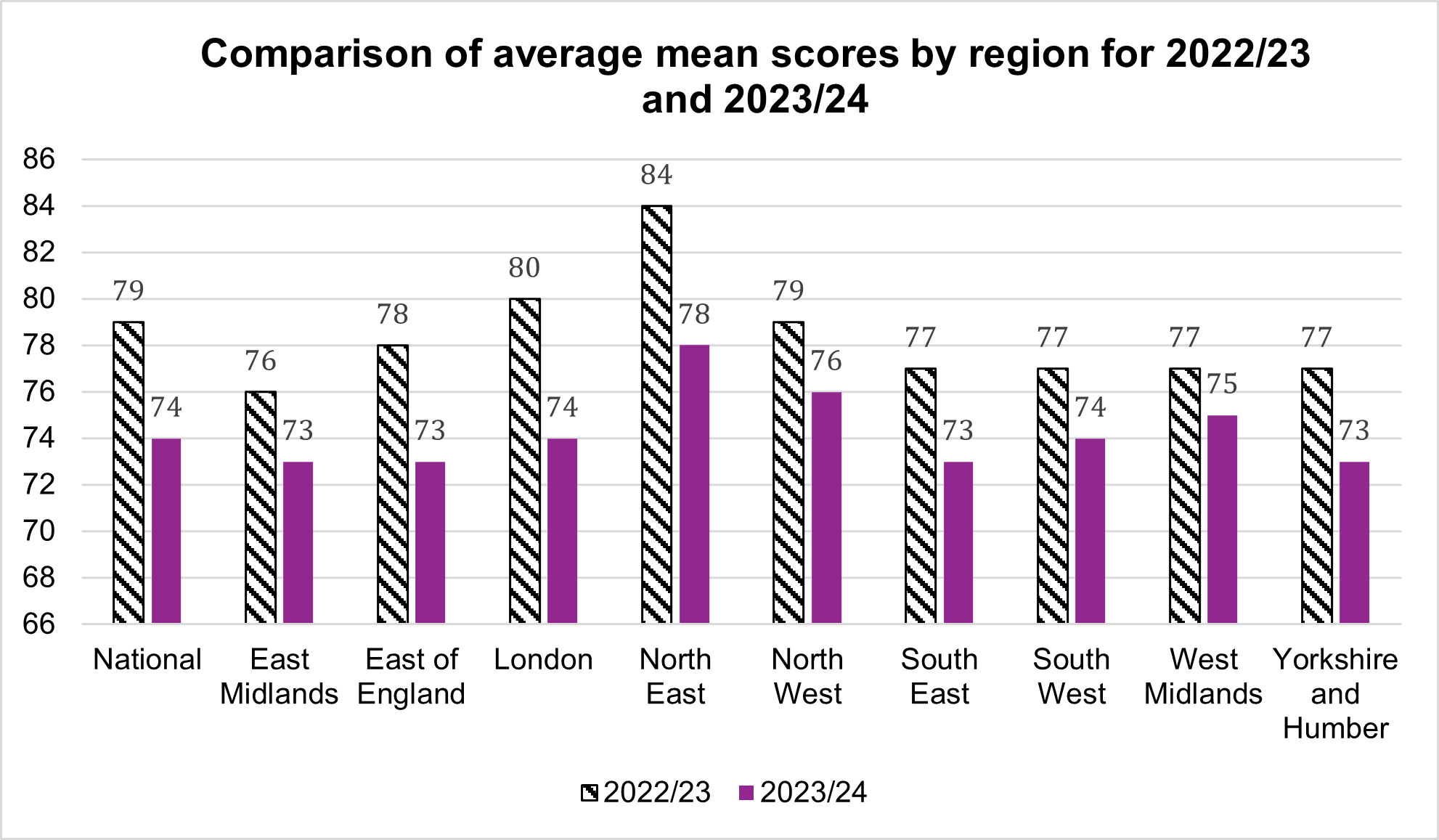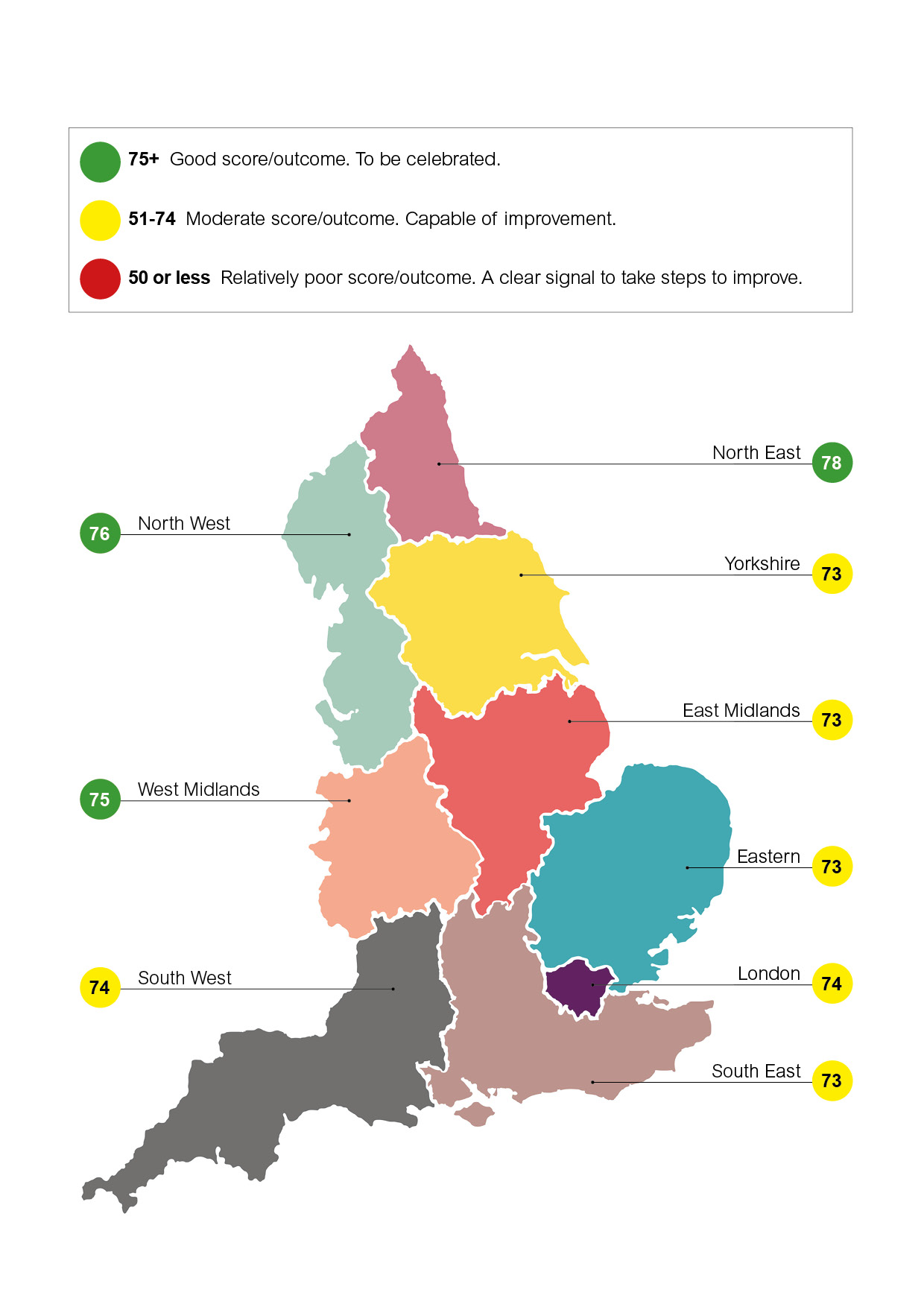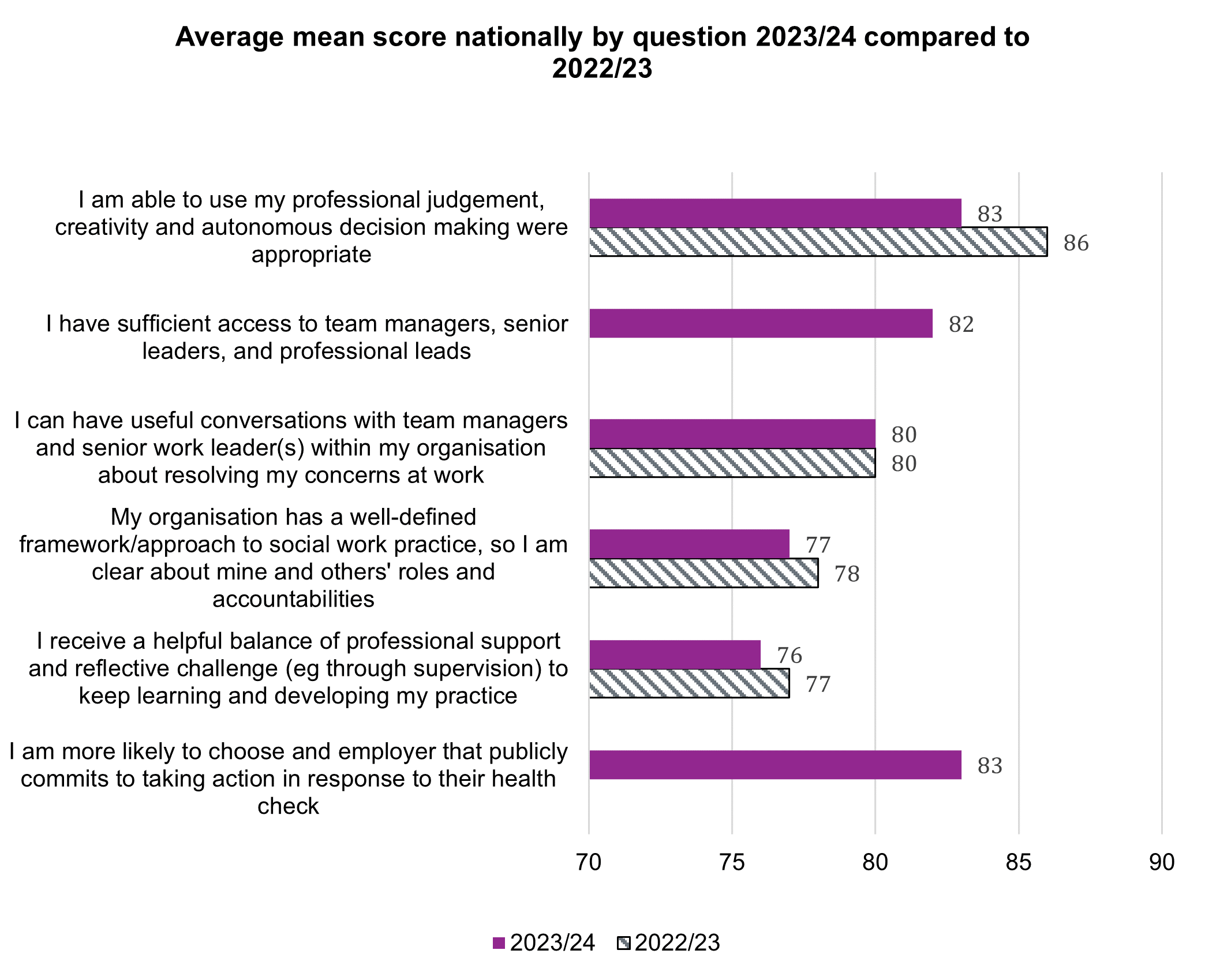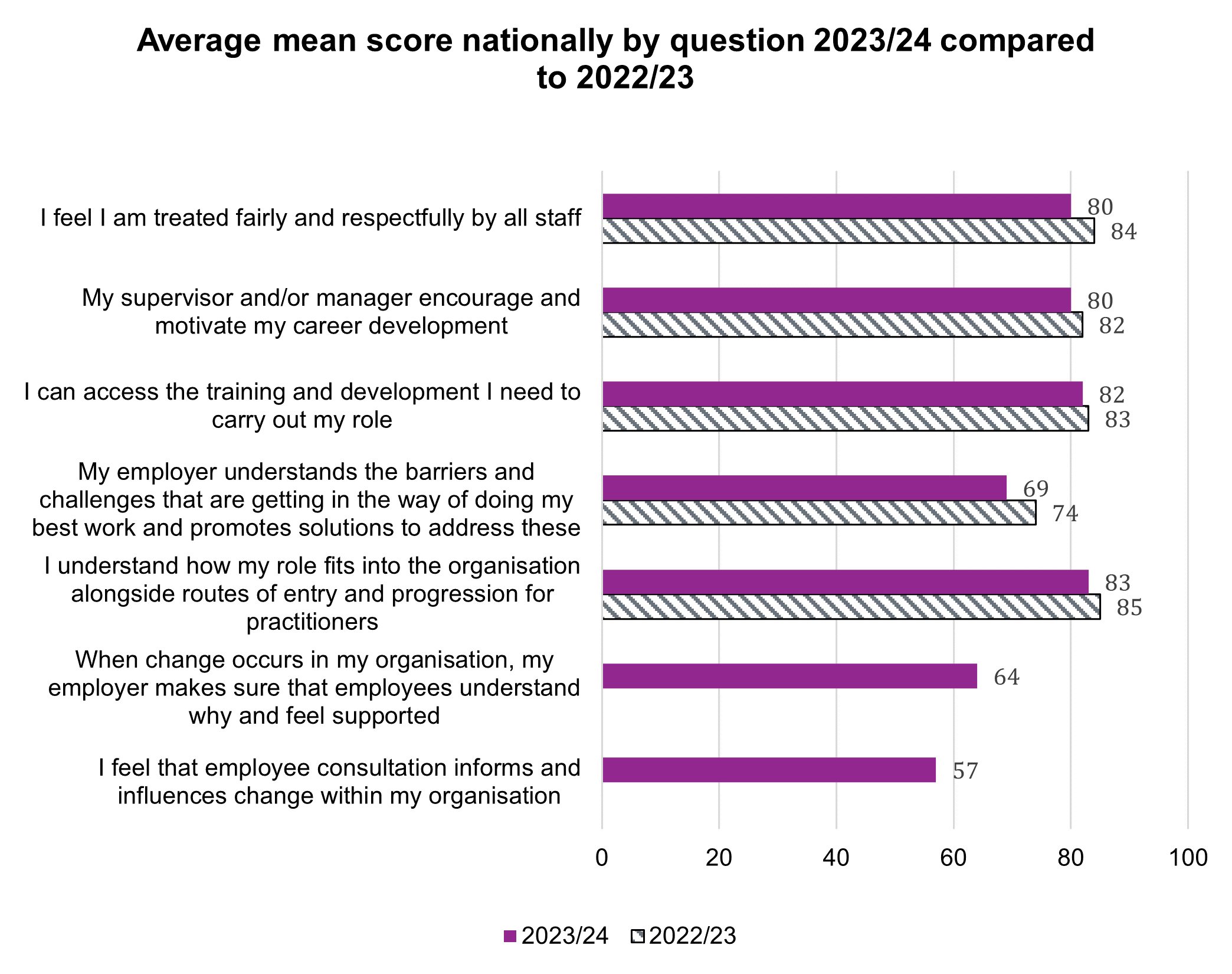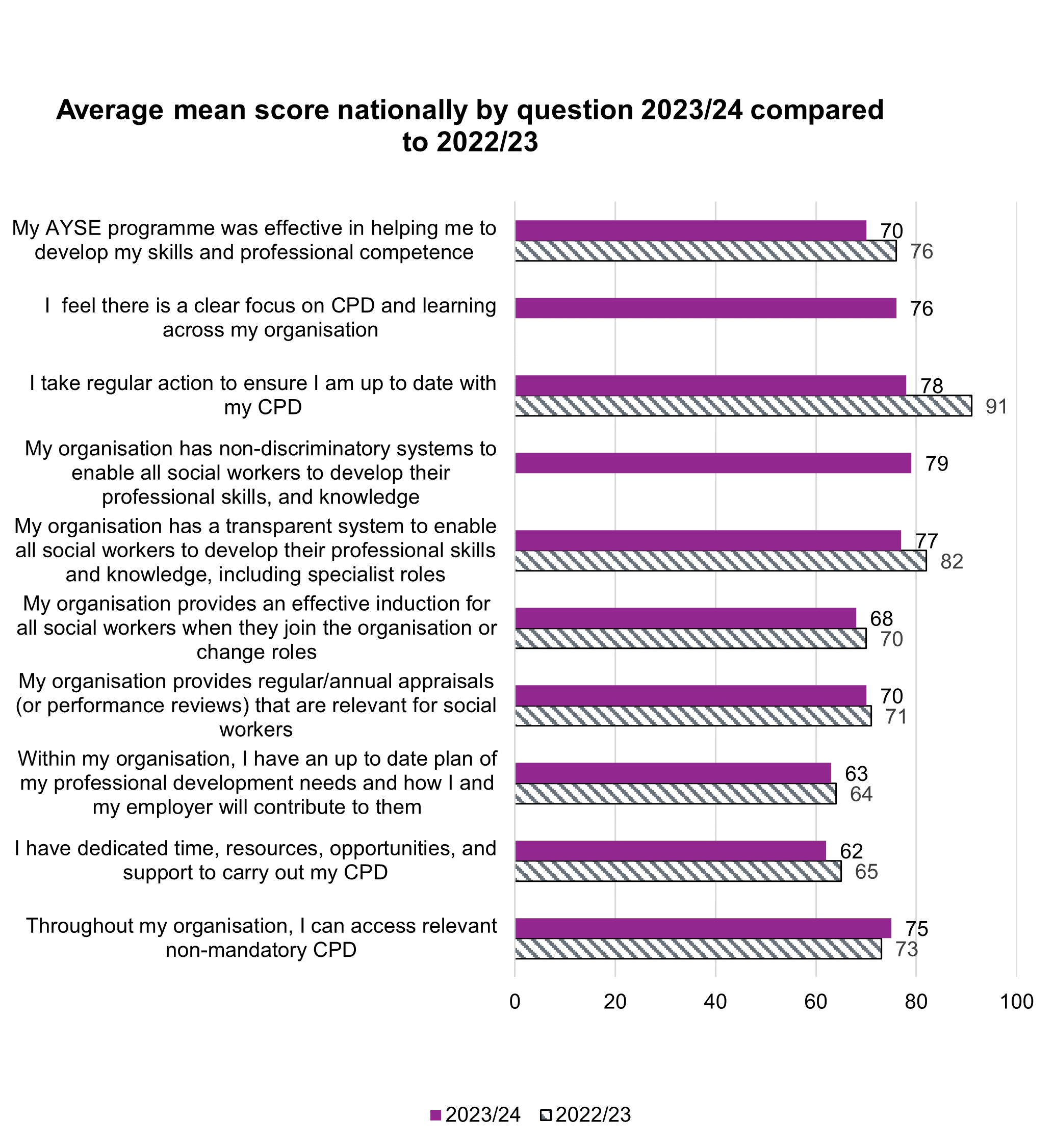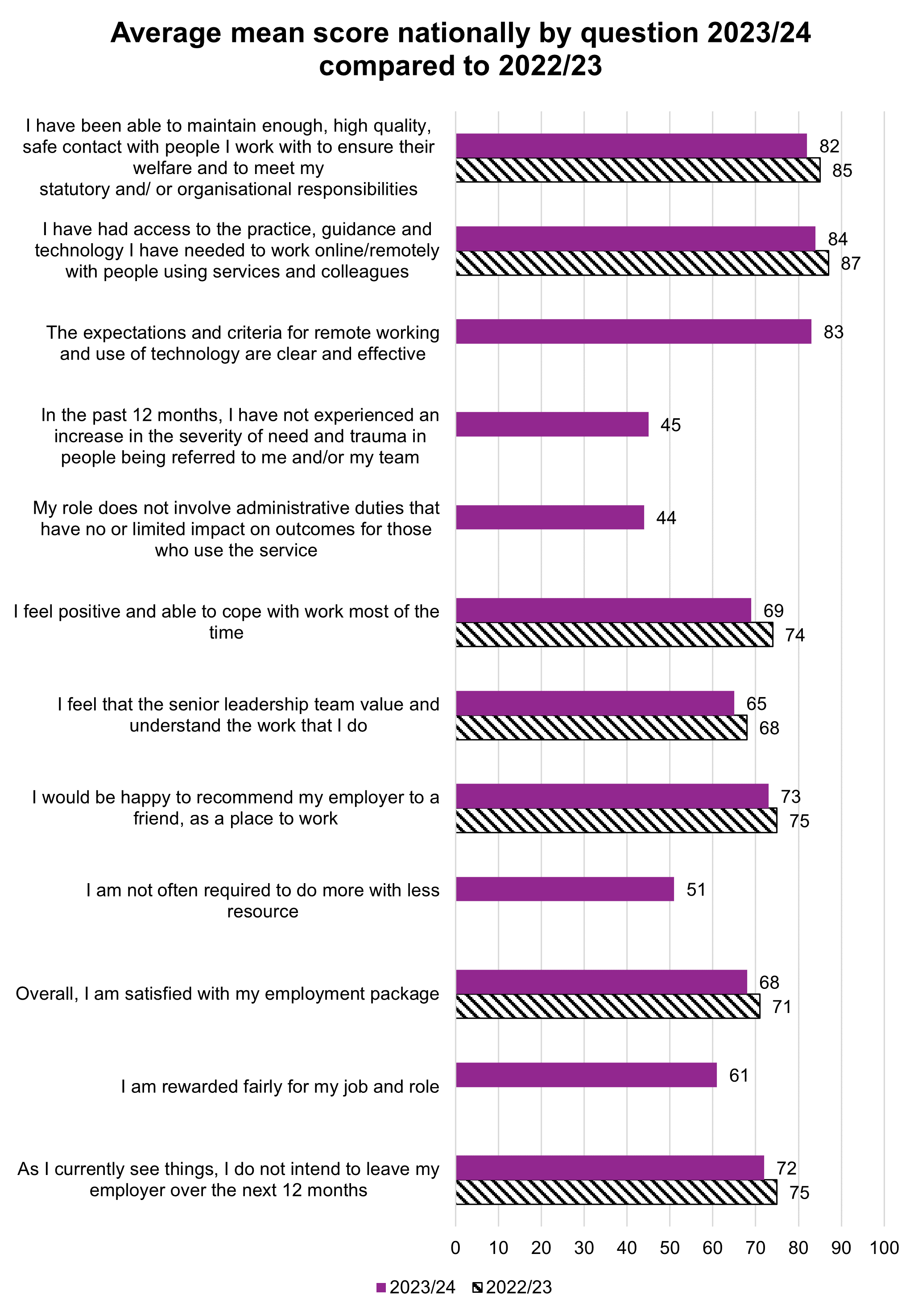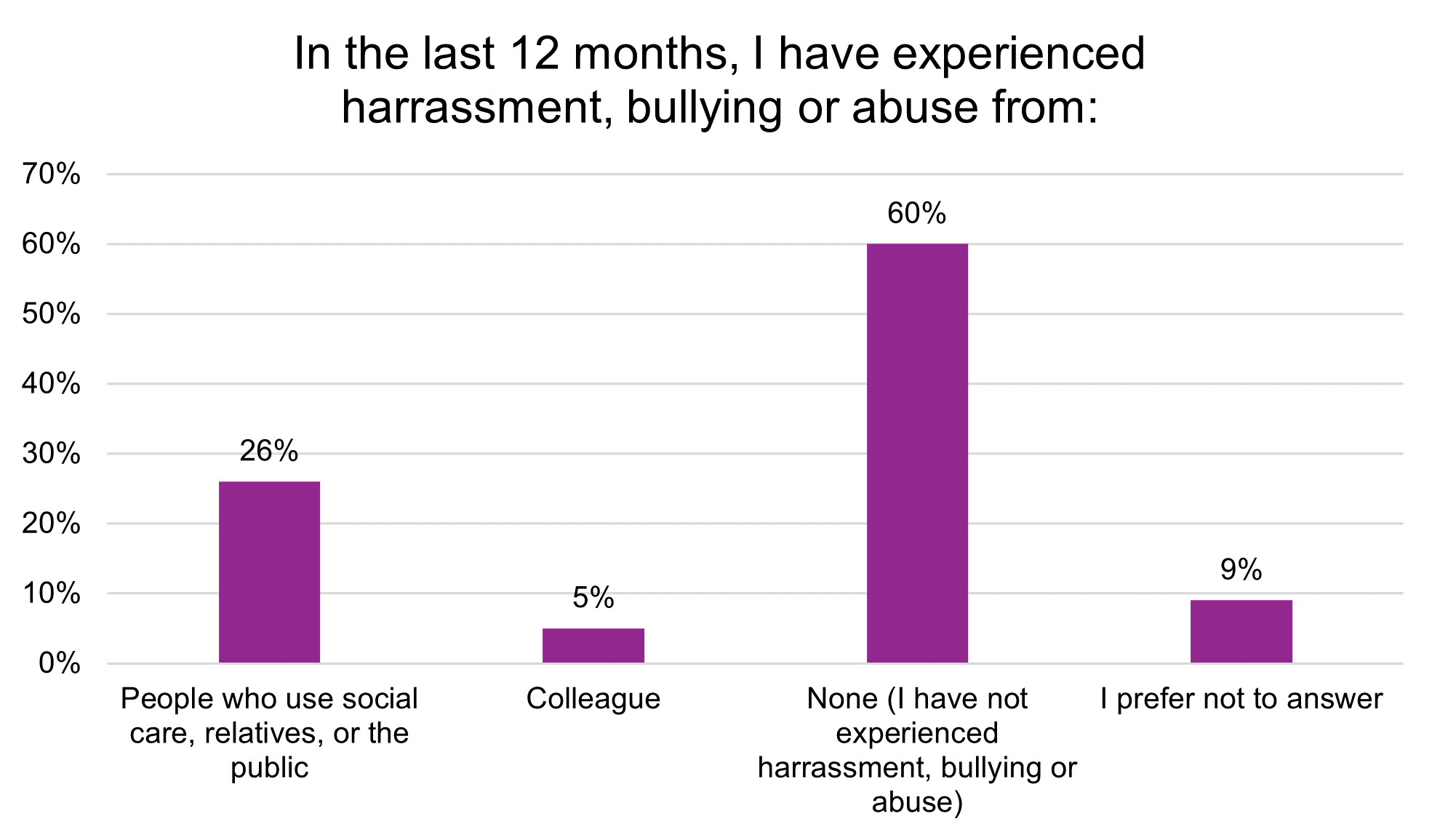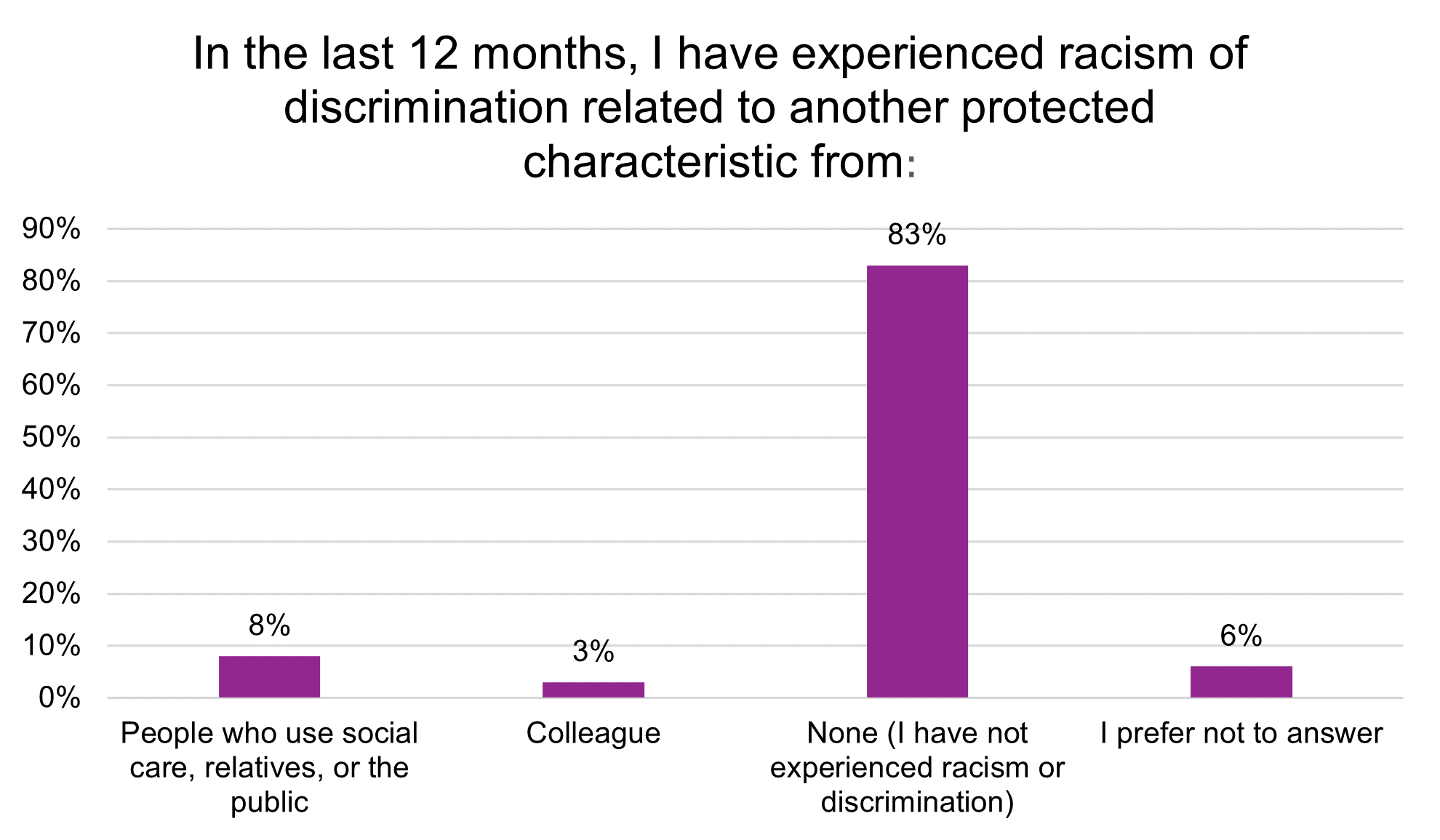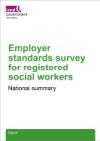
Introduction
This is the fourth year that we have held the health check. We have continued to see the value of good social work in transforming people’s lives and protect them from harm. The social care workforce is responsible for supporting thousands of individuals, children, and families to improve their well-being and their chances in life. Social work is vital in helping people face a wide range of challenges, from poverty to dealing with mental health issues and disabilities. They play an essential role in supporting individuals to maintain their independence and dignity.
The social care sector employs over 1.4 million people and by 2030 there will be around half a million more vacancies. 2023 saw a rise of 24 per cent in the number of children’s social worker starters, with 6,000 joining the profession, the highest amount since 2017.
The survey helps organisations to better understand critical questions about the experiences of their employees:
- How well do employers deliver the employer standards?
- How do employees perceive their working environment?
- What factors influence engagement at work and increase the likelihood of employees staying with organisations?
The employer standards for social workers were refreshed in 2020. The Standards set out the shared core expectations of employers which will enable social workers in all employment settings to work effectively and safely. Launched in 2020, this is the fourth survey on the employer standards.
Please note that this summary report relies on data collected from registered social workers employed by local authorities and related agencies. While the results are considered to represent a reasonable, national sample, no claims are made for generalisation of the results to other areas of the UK.
Executive summary
This year, the survey received over 15,000 responses from over 160 organisations. The full list of participating organisations can be seen in Appendix D. This year we received a higher number of responses from children’s social workers compared to previous years.
This document will outline the key findings from the survey. A full report of the findings at a national and regional level is available on the Knowledge Hub site. This summary compares the standards with the previous year’s survey (2022) and summarises some key findings that have emerged from the responses, including:
- an overall decline in satisfaction with the employer standards of five per cent
- a continuing positive perception of how employers are delivering a strong and clear social work framework of 80 per cent.
- new questions added to the workplace experience section of the survey indicate increased dissatisfaction
- a decrease in satisfaction with workforce planning systems of 8 per cent
- continuing professional development remaining as the lowest scoring standard; the results indicate issues with the time resources and support social workers are given to participate in CPD.
The overall results from the survey suggest that there has been a decline in response across all but one of the standards, most notably in effective workforce planning systems. We can also see there is room to improve social worker’s continuing professional development and workplace experience.
The employer standards
Standard 1 – Strong and clear social work framework
This standard is about promoting a clear statement about the principles that constitute good social work practice, and how those principles function across the full range of social work settings.
Standard 2 – Effective workforce planning systems
This standard is about using effective workforce planning systems to make sure that the right number of social workers, with the right level of skills and experience, are available to meet current and future service demands.
Standard 3 – Safe workloads and case allocation
This standard is about ensuring employees do not experience excessive workloads, resulting in unallocated cases and long waiting times for individuals.
Standard 4 – Wellbeing
This standard is about promoting a positive culture for employee wellbeing and supporting social workers to have practical tools, resources, and the organisational environment they need to practice effectively and safely.
Standard 5 – Supervision
This standard is about making sure students and qualified practitioners can reflect critically on their practice through high quality, regular supervision being an integral part of social work practice.
Standard 6 – Continuing professional development (CPD)
This standard is about social workers being provided with the time and opportunity to learn, keep their knowledge and skills up to date, and critically reflect on the impact on their practice.
Standard 7 – Professional registration
This standard is about supporting social workers to maintain their professional registration with the regulator.
Standard 8 – Strategic partnerships
This standard is about creating strong partnerships and good collaboration between employers, higher education institutions, and other training providers.
Participants
The survey was carried out from February 2024 to April 2024. It received 7,068 responses from registered social workers, who contributed 46 per cent of the total survey responses. Based on feedback from previous health checks, this year’s survey presented a revised set of questions with enhanced questions on workplace experience and more detailed questions on each of the standards. As a result, we have been able to capture a more detailed understanding of satisfaction amongst social workers and their perception of the employer standards.
| Occupation | % |
|---|---|
| Registered social workers | 46 |
| Occupational therapists | 12 |
| Social care workers | 42 |
Methodology
The data from the survey was interpreted using a mean average score for each question as the survey sought to measure attitudes and opinions on a scale. Respondents were asked to select options from ‘strongly disagree’ to ‘strongly agree’. The mean score is used to determine the average performance of a question so it can also be referred to as the average satisfaction score and can be converted to the same number as a percentage to indicate the average percentage of the score relative to the total score.
Scores or percentages for a question between 0-50 indicate a low outcome, scores between 51-74 indicate a moderate outcome and scores between 75-100 indicate a good outcome.
Statistically significant
This term describes a mathematical measure of difference between groups. Throughout the report, the term ‘statistically significant’ may be used. A difference of 5 percentage points demonstrates that a difference in a response is statistically significant. A difference of less than 5 is not considered statistically significant, but these responses may still be shown to make comparisons.
The results at a glance
| Employer standard | Average mean scores 2022/23 | Average mean scores 2023/24 | Change |
|---|---|---|---|
| Standard 1: strong and clear social work framework |
80 |
80 |
0 |
| Standard 2: effective workforce planning systems |
82 |
74 |
-8 |
| Standard 3: safe workloads and case allocation |
77 |
75 |
-2 |
| Standard 4: wellbeing |
79 |
77 |
-2 |
| Standard 5: supervision |
77 |
76 |
-1 |
| Standard 6: continuing professional development (CPD) |
74 |
72 |
-2 |
| Standard 7: professional registration |
80 |
78 |
-2 |
| Standard 8: strategic partnership |
80 |
76 |
-4 |
The standards overall
How well do employers deliver the employer standards for social workers?
The employer standards for social workers set out the shared core expectations of employers which enable social workers in all employment setting to work effectively and safely. The overall mean score for standards 1-8 declined from 79 per cent (2022/23) to 74 per cent. This decline is statistically significant.
In 2023, the overall performance of the standards across adults, children’s and mental health registered social workers were similar, with children’s social workers responding slightly less favourably in 7 out of 8 standards compared to the overall average. These differences were not statistically significant.
The most favourably received standard for 2023 was standard 1 (strong and clear social work framework) with a mean score of 80 per cent. Standard 7 (professional registration) also had a high mean score of 78 per cent.
The least favourably received was standard 6 (CPD continuing professional development) with a mean score of 72 per cent. Standard 2 (effective workforce planning systems) received a lower mean score of 74 per cent.
The survey also tried to give a picture of variations across different groups. There were broadly similar responses across different employers (local authority, NHS Trust, and others). Mean score generally declined with length of service. Social workers with less than one year of service gave an average mean score of 81 per cent compared to the mean score of social workers with 6-10 years of service – 74 per cent.
The only standard that received no change in satisfaction from the year before was standard 1 – strong and clear social work framework (mean score 80 per cent).
There were marginal declines (ranging from 1-4 per cent) in favourability across 6 standards. This shows there were slight declines to how social workers perceive safe workloads and case allocation (standard 3 – 75 percent), wellbeing (standard 4 – 77 per cent), supervision (standard 5 – 76 per cent), continuing professional development (standard 6 – 72 per cent) and strategic partnership (standard 8 – 76 per cent).
The only standard that received a decrease in favourability of statistical significance was standard 2, effective workforce planning systems. There was a decrease of 8 per cent, from 82 per cent in 2022/23 to 74 per cent in 2023/24.
Regional differences
The overall performance of the employer standards for each region is shown in shown in Appendix A in table format. A bar chart is also shown below.
The national average mean score alongside the mean score received from 6 out of the 8 regions were below the ‘good’ range (75+). All received a mean score within the ‘moderate’ range that indicates capability for improvement.
Social workers in the North East of England responded to the standards most favourably (mean score of 78 per cent) in comparison to social workers from the East Midlands, East of England, South East and Yorkshire and Humber who responded to the standards least favourably (mean score of 73 per cent).
Even though they were not the lowest scoring, London and the North East saw the biggest decrease in satisfaction since last year. Both decreases were of statistical significance. Both saw a 6 per cent decrease, with London going from 80 per cent (2022/23) to 74 per cent (2023/24) and the North East from 84 per cent (2022/23) to 78 per cent (2023/24).
Key findings
Strong and clear social work framework – standard 1
This standard received an overall mean score of 80 per cent and saw no change from 2022/23. The North East of England received the highest mean score for this standard at 82 per cent.
Social workers strongly agree that they are able to use their professional judgement, creativity and autonomous decision making when appropriate (83 per cent). They responded similarly that they are more likely to choose an employer that publicly commits to taking action in response to their health check (83 per cent).
Effective workforce planning systems – standard 2
This standard received an overall mean score of 74 per cent and saw the biggest decrease since 2022/23 of 8 per cent. This decrease was in part by two new questions which got low mean scores.
The results from these new questions show that social workers do not agree that “employee consultation informs and influences change’ within their organisations (mean score – 57 per cent) and that they do not agree their employer makes sure employees understand why change occurs in their organisation and feel supported (mean score – 64 per cent).
Questions around fair treatment, supervision, access to training and understanding of how the role fits into the organisation all received mean scores of over 80 per cent. Every question in this set received a mean score in the ‘good’ range.
Continuing professional development (CPD) – standard 6
Continuing professional development received an average mean score of 72 per cent. This is close to the top end of the ‘moderate’ range (51-74).
Standard 6 was the least favourably received standard across the 8 employer standards, which was also the case in the 2022 and 2021 surveys. In 2022/23, the standard received a score of 74 per cent, showing that this standard has decreased slightly over the last year. There was some variation in response across service area. Children’s and mental health registered social workers responded slightly less favourably with mean scores of 70 per cent and 71 per cent respectively. In comparison, Adults registered social workers gave a mean score of 74 per cent. These differences are not of statistical significance.
Three out of the ten questions for standard 6 received a ‘moderate’ score (51-74). Social workers do not feel entirely satisfied that they have dedicated time, resources, and support to carry out CPD (mean score - 62 per cent). They also did not entirely agree that they had an up-to-date plan of their professional development needs and how their employer will contribute to them (mean score – 63 per cent).
There is also room to improve the satisfaction from the AYSE programmes to help social workers develop and learn since the average overall score for this question was in the ‘moderate’ range at 70 per cent, this is a decrease from last year’s score of 76 per cent. There were other significant decreases in satisfaction across two other questions. Less social workers feel they take regular action to ensure they are up to date with their CPD, with the overall score decreasing from 91 to 78 per cent. There was lower agreement that organisations had transparent systems to enable all social workers to develop their professional skills and knowledge, with the overall score decreasing from 82 to 77 per cent.
Workplace experiences
The survey also asked social workers some supplementary questions to understand how they feel about their workplace experiences generally. The set of questions asked in the workplace experience section sought to answer how social workers feel about their employee experience and their employment package more generally.
The overall mean score for workplace experience was in the ‘moderate’ range at 66. There were scores in the ‘poor’ range (below 50) across two questions. Social workers indicated that in the past 12 months, they had experienced an increase in the severity of need and trauma in people being referred to their service. They also indicated that they felt as though their role involved administrative duties that have no or limited impact of outcomes for service users.
The questions included in this section are different from previous years, so no direct comparison is available for overall mean score. We have seen a decrease in mean score on every question that has been repeated this year. For example, we can see a significant decrease (5 per cent) in response to the statement: ‘I feel positive and able to cope with work most of the time’.
Bullying, harassment, and discrimination
The survey also asked social workers whether they had experienced or witnessed bullying, harassment, or discrimination during the last 12 months. 26 per cent of social workers said they had been bullied by service users or the public, 5 per cent by a manager and 5 per cent by a colleague. 8 per cent of social workers said they had experienced racism or discrimination from service users or the public, 3 per cent from managers and 3 per cent from a colleague.
Demographics
Ethnicity
The number of survey respondents by ethnic groups and scores of the overall standards can be seen in Appendix A and C. Registered social workers who were from a Black background responded most favourably (mean score of 81 per cent). In comparison, those from a mixed race or other background responded less favourably (73 and 72 per cent respectively). Those who preferred not to state their background responded the least favourably (mean score of 65 per cent). This has fallen from 68 per cent in 2022/23.
Disability
21 per cent of social workers survey said that they had a physical condition in the last 12 months that has impacted their ability to work effectively. Those who answered that they had responded less favourably than those who had not, 72 per cent compared to 78 per cent. This is a statistically significant difference. Those who preferred not to say answered the least favourably (mean score of 68 per cent).
13 per cent of social workers surveyed said that they had a mental health condition in the last 12 months that has impacted on their ability to work effectively. Those that had a mental health condition had a significantly lower mean score of 68 per cent, 10 percentage points lower than social workers that have not had a mental health condition in the last 12 months. Again, those who preferred not to say had the lowest mean score of 67 per cent.
In last year’s survey, social workers who declared they were disabled responded less favourably to the standards with a decrease in satisfaction of 5 percentage points. While it is not directly comparable, due to new questions focussing on mental and physical conditions in the last 12 months, we can see that this difference has increased.
Across social workers who have had both mental and physical health conditions, we can see significantly lower satisfaction compared to those that have not.
Gender
77 per cent over social workers surveyed identified as female, 13 per cent as male, less than 1 per cent as non-binary and less than 1 per cent as transgender. These are similar to last year’s breakdown with a slight reduction in the proportion of respondents who identify as female (from 81 per cent to 77 per cent)
The performance of the standards across male and female social workers was identical, both groups giving a mean score of 77 per cent. There were significant differences in the score given by social workers who identified as non-binary or preferred not to state their gender. Social workers who identified as non-binary responded less favourably to the standards (mean score of 61 per cent) and social workers who preferred not to state their gender responded the least favourably to the standards overall (mean score of 64 per cent).
There were not enough responses to generate an overall score for social workers who identified as transgender or other.
| Gender | Mean overall score of standards 2022/23 | Mean overall score of standards 2023/24 |
|---|---|---|
| Female | 80 | 77 |
| Male | 78 | 77 |
| Non-binary | 65 | 61 |
| Transgender | - | - |
| Other | - | - |
| Prefer not to say | 64 | 64 |
Age
The number of survey respondents by age and the performance of the standards when comparing the age of respondents can be seen in Appendix A and C. Registered social workers who are aged 65+ responded most favourably to the standards (mean score of 80 per cent). Social workers who preferred not to state their age responded least favourably to the standards overall (mean score of 68 per cent). Across all demographic measures, we can see that those who ‘prefer not to say’ responded the least favourably to the standard. This trend was also apparent in last year’s survey.
|
Age |
Mean overall score of standards 2022/23 |
Mean overall score of standards 2023/24 |
|---|---|---|
|
24 and below |
82 |
78 |
|
25-34 |
78 |
75 |
|
35-44 |
79 |
75 |
|
45-54 |
79 |
77 |
|
55-64 |
79 |
77 |
|
65+ |
84 |
80 |
|
Prefer not to say |
67 |
68 |
Conclusion
As we face increasing demand on social care services and a high number of projected vacancies within the sector across the next decade, it is positive that we have seen overall high responses to key indicators of workforce satisfaction. In particular, the results of the survey show that social workers continue to feel confident about the principles that underpin their practice. This was shown through the continued high response to standard 1 (strong and clear social work framework). We also saw positive responses to questions on fair treatment, supervision, and wellbeing in the workplace.
Nonetheless, the overall mean score nationally for all the standards did see a decrease to 74 per cent meaning it has fallen into the top end of the ‘moderate’ range of 51-74. This indicates that there is room for improvement in how the employer standards are being delivered across organisations. Social workers have consistently responded least favourably to standard 6 (continuing professional development), it has received the lowest mean score since the refreshed employer standards were introduced in 2020. This result indicates there is need to strengthen the opportunities social workers are given to learn and keep their skills and knowledge up to date. It is essential that social workers are given enough time to undertake CPD and manage their workload, to enable reflection and professional development throughout their careers.
We have also seen a decline in satisfaction across all the standards, with the most significant decrease in response to standard 2 from 82 to 74 per cent (effective workforce planning systems). With an 8 per cent decrease in mean score, standard 2 has moved from the most favourable standard in 2022/23 to the less favourable than 6 out of the 8 standards. With increasing service pressures, effective workforce planning systems are vital to ensure that there are sufficient resources to meet demands. There is room to improve how social workers are consulted and supported when change occurs to ensure they feel as though they can have impact and influence over the direction of travel within their organisations.
The lowest mean scores across the survey were within the workplace experience section. This section gave a general picture of how satisfied social workers are within their workplaces, so is an important measure of the ‘health’ of the workforce. Respondents were presented with a revised set of questions in this year’s survey; with new questions that provide a more comprehensive understanding of their experiences. Across these new questions, the mean scores ranged from 44 to 61 per cent with 2 in the ‘poor range’ (50 or less). Even though, a direct comparison to last year’s survey cannot be provided due to changes in the questions. We can note that there were decreases across all repeated questions.
It is important to ensure that improvements are made across the standards to bring the overall scores on an upward trajectory. We will be making resources directly available to support organisations with action planning based on their results, you can find more resources and the full results from the survey on the Knowledge Hub.
Appendix A
The following tables summarise results for accessibility purposes.
| Region | Overall mean score 2022/23 | Overall mean score 2023/24 | Change |
|---|---|---|---|
| National | 79 | 74 | -5 |
| East Midlands | 76 | 73 | -3 |
| East of England | 78 | 73 | -5 |
| London | 80 | 74 | -6 |
| North East | 84 | 78 | -6 |
| North West | 79 | 76 | -3 |
| South East | 77 | 73 | -4 |
| South West | 77 | 74 | -3 |
| West Midlands | 77 | 75 | -2 |
| Yorkshire and Humber | 77 | 73 | -4 |
| Employer standard | Average mean scores 2022/23 | Average mean scores 2023/24 | Change |
|---|---|---|---|
| Standard 1: strong and clear social work framework |
80 |
80 |
0 |
| Standard 2: effective workforce planning systems |
82 |
74 |
-8 |
| Standard 3: safe workloads and case allocation |
77 |
75 |
-2 |
| Standard 4: wellbeing |
79 |
77 |
-2 |
| Standard 5: supervision |
77 |
76 |
-1 |
| Standard 6: continuing professional development (CPD) |
74 |
72 |
-2 |
| Standard 7: professional registration |
80 |
78 |
-2 |
| Standard 8: strategic partnership |
80 |
76 |
-4 |
| Service area | Average mean score for standards 1 to 8 |
|---|---|
| Adults | 77 |
| Children | 74 |
| Mental Health | 75 |
| Gender | Average mean score for standards 1 to 8 |
|---|---|
| Male | 77 |
| Female | 77 |
| Non binary | 61 |
| Prefer not to say | 64 |
| Age | Average mean score for standards 1 to 8 |
|---|---|
| 24 and below | 78 |
| 24 to 34 | 75 |
| 35 to 44 | 75 |
| 45 to 54 | 77 |
| 55 to 64 | 77 |
| 65 plus | 80 |
| Prefer not to say | 68 |
| Ethnicity | Average mean score for standards 1 to 8 |
|---|---|
| Arab | Insufficient data |
| Asian | 79 |
| Black | 81 |
| Mixed race | 73 |
| White | 76 |
| Other ethnic group | 72 |
| Prefer not to say | 65 |
| Answer | Average mean score for standards 1 to 8 |
|---|---|
| Yes | 72 |
| No | 78 |
| Prefer not to say | 68 |
| Answer | Average mean score for standards 1 to 8 |
|---|---|
| Yes | 68 |
| No | 78 |
| Prefer not to say | 67 |
Appendix B
| Question | Mean score 2022/23 | Mean score 2023/24 |
|---|---|---|
| I am able to use my professional judgement, creativity and autonomous decision making were appropriate | 83 | |
| I have sufficient access to team managers, senior leaders, and professional leads | 77 | 76 |
| I can have useful conversations with team managers and senior work leader(s) within my organisation about resolving my concerns at work | 78 | 77 |
| My organisation has a well-defined framework/approach to social work practice, so I am clear about mine and others' roles and accountabilities | 80 | 80 |
| I receive a helpful balance of professional support and reflective challenge (eg through supervision) to keep learning and developing my practice | 82 | |
| I am more likely to choose and employer that publicly commits to taking action in response to their health check | 86 | 83 |
| Question | Mean score 2022/23 | Mean score 2023/24 |
|---|---|---|
| I feel I am treated fairly and respectfully by all staff | 84 | 80 |
| My supervisor and/or manager encourage and motivate my career development | 82 | 80 |
| I can access the training and development I need to carry out my role | 83 | 82 |
| My employer understands the barriers and challenges that are getting in the way of doing my best work and promotes solutions to address these | 74 | 69 |
| I understand how my role fits into the organisation alongside routes of entry and progression for practitioners | 85 | 83 |
| When change occurs in my organisation, my employer makes sure that employees understand why and feel supported | 64 | |
| I feel that employee consultation informs and influences change within my organisation | 57 |
| Question | Mean score 2022/23 | Mean score 2023/24 |
|---|---|---|
| My AYSE programme was effective in helping me to develop my skills and professional competence | 76 | 70 |
| I feel there is a clear focus on CPD and learning across my organisation | 76 | |
| I take regular action to ensure I am up to date with my CPD | 91 | 78 |
| My organisation has non-discriminatory systems to enable all social workers to develop their professional skills, and knowledge | 79 | |
| My organisation has a transparent system to enable all social workers to develop their professional skills and knowledge, including specialist roles | 82 | 77 |
| My organisation provides an effective induction for all social workers when they join the organisation or change roles | 70 | 68 |
| Within my organisation, I have an up to date plan of my professional development needs and how I and my employer will contribute to them | 71 | 70 |
| I have dedicated time, resources, opportunities, and support to carry out my CPD | 65 | 62 |
| Throughout my organisation, I can access relevant non-mandatory CPD | 73 | 75 |
| Question | Mean score 2022/23 | Mean score 2023/24 |
|---|---|---|
| I have been able to maintain enough, high quality, safe contact with people I work with to ensure their welfare and to meet my statutory and/ or organisational responsibilities | 85 | 82 |
| I have had access to the practice, guidance, and technology I have needed to work online/remotely with people using services and colleagues | 87 | 84 |
| The expectations and criteria for remote working and use of technology are clear and effective | 83 | |
| In the past 12 months, I have not experienced an increase in the severity of need and trauma in people being referred to me and/or my team | 45 | |
| My role does not involve administrative duties that have no or limited impact on outcomes for those who use the service | 44 | |
| I feel positive and able to cope with work most of the time | 74 | 69 |
| I feel that the senior leadership team value and understand the work that I do | 68 | 65 |
| I would be happy to recommend my employer to a friend, as a place to work | 75 | 73 |
| I am not often required to do more with less resource | 51 | |
| Overall, I am satisfied with my employment package | 71 | 68 |
| I am rewarded fairly for my job and role | 61 | |
| As I currently see things, I do not intend to leave my employer over the next 12 months | 75 | 72 |
| In the last 12 months, I have experienced harassment, bullying or abuse from: | Response rate |
|---|---|
| People who use social care, relatives, or the public | 26 per cent |
| Colleague | 5 per cent |
| None (I have not received abuse) | 60 per cent |
| I prefer not to say | 9 per cent |
| In the last 12 months, I have experienced racism or discrimination related to another protected characteristic from: | Response rate |
|---|---|
| People who use social care, relatives, or the public | 8 per cent |
| Colleague | 3 per cent |
| None (I have not experienced racism or discrimination) | 83 per cent |
| I prefer not to say | 6 per cent |
Appendix C
| Ethnic group | Number of respondents |
|---|---|
| Arab | 2 |
| Asian | 206 |
| Black | 548 |
| Mixed race | 146 |
| White | 5291 |
| Other ethnic group | 106 |
| Prefer not to say | 495 |
| Age | Number of respondents |
|---|---|
| 24 and below | 105 |
| 25-34 | 1030 |
| 35-44 | 1843 |
| 45-54 | 1904 |
| 55-64 | 1454 |
| 65+ | 147 |
| Prefer not to say | 316 |
| Gender | Number of respondents |
|---|---|
| Female | 5473 |
| Male | 953 |
| Non-binary | 13 |
| Transgender | 4 |
| Other | 9 |
| Prefer not to say | 341 |
| Answer | Number of respondents |
|---|---|
| No | 4925 |
| Yes | 1460 |
| Prefer not to say | 398 |
| Answer | Number of respondents |
|---|---|
| No | 5410 |
| Yes | 933 |
| Prefer not to say | 441 |
Appendix D
Full list of participating bodies:
- Barnsley Metropolitan Borough Council
- Bath and North East Somerset Council
- Bedford Borough Council
- Birmingham City Council
- Blackburn with Darwen Borough Council
- Blackpool Council
- Bolton Metropolitan Borough Council
- Bournemouth, Christchurch, and Poole Council
- Bracknell Forest Borough Council
- City of Bradford Metropolitan Borough Council
- Brighton and Hove City Council
- Bristol City Council
- Buckinghamshire Council
- Bury Metropolitan Borough Council
- Calderdale Metropolitan Borough Council
- Cambridgeshire County Council
- Central Bedfordshire Council
- Cheshire East Council
- Cheshire West and Chester Council
- Westminster City Council
- Cornwall Council
- City of London Corporation
- Coventry City Council
- Cumberland Council
- Darlington Borough Council
- Derby City Council
- Derbyshire County Council
- Devon County Council
- City of Doncaster Council
- Dorset Council
- Dudley Metropolitan Borough Council
- Durham County Council
- East Riding of Yorkshire Council
- East Sussex County Council
- Essex County Council
- Essex Partnership University NHS Foundation Trust
- Gateshead Metropolitan Borough Council
- Gloucestershire County Council
- Halton Borough Council
- Hampshire County Council
- Hartlepool Borough Council
- Herefordshire Council
- Hertfordshire County Council
- Hull City Council
- Isle of Wight Council
- Council of the Isles of Scilly
- Government of Jersey
- Kent County Council
- Kirklees Metropolitan Borough Council
- Knowsley Metropolitan Borough Council
- Lancashire County Council
- London Borough of Barking and Dagenham Council
- London Borough of Barnet Council
- London Borough of Bexley Council
- London Borough of Brent Council
- London Borough of Bromley Council
- London Borough of Camden Council
- London Borough of Croydon Council
- London Borough of Ealing Council
- London Borough of Enfield Council
- London Borough of Hackney Council
- London Borough of Hammersmith and Fulham Council
- London Borough of Haringey Council
- London Borough of Harrow Council
- London Borough of Havering Council
- London Borough of Hillingdon Council
- London Borough of Hounslow Council
- London Borough of Islington Council
- London Borough of Lambeth Council
- London Borough of Lewisham Council
- London Borough of Merton Council
- London Borough of Newham Council
- London Borough of Redbridge Council
- London Borough of Southwark Council
- London Borough of Sutton Council
- London Borough of Tower Hamlets Council
- London Borough of Waltham Forest Council
- Leeds City Council Leicester City Council
- Leicestershire County Council
- Lincolnshire County Council
- Liverpool City Council
- Luton Borough Council
- Manchester City Council
- Medway Council
- Middlesbrough Borough Council
- Milton Keynes City Council
- Newcastle upon Tyne City Council
- Norfolk City Council
- North East Lincolnshire Council
- North Lincolnshire Council
- North Northamptonshire Council
- North Somerset Council
- North Tyneside Metropolitan Borough Council
- North Yorkshire Council
- Northumberland County Council
- Nottingham City Council
- Nottinghamshire County Council
- Oldham Metropolitan Borough Council
- Oxfordshire County Council
- Peterborough City Council
- Plymouth City Council
- Portsmouth City Council
- Royal Borough of Greenwich
- Royal Borough of Kensington and Chelsea
- Royal Borough of Kingston upon Thames
- Royal Borough of Windsor and Maidenhead
- Reading Borough Council
- Redcar and Cleveland Borough Council
- Richmond and Wandsworth Councils
- Rochdale Borough Council
- Rotherham Metropolitan Borough Council
- Rutland County Council
- Salford City Council Sandwell Metropolitan Borough Council
- Sefton Metropolitan Borough Council
- Sheffield City Council
- Shropshire Council
- Slough Borough Council
- Solihull Metropolitan Borough Council
- Somerset Council
- South Gloucestershire Council
- South Tyneside Metropolitan Borough Council
- Southampton City Council
- Southend-on-sea City Council
- St Helens Borough Council
- Staffordshire County Council
- Stockport Metropolitan Borough Council
- Stockton-on-tees Borough Council
- Stoke-on-Trent City Council
- Suffolk County Council
- Sunderland City Council
- Surrey County Council
- Swindon Borough Council
- Tameside Metropolitan Borough Council
- Telford and Wrekin Council
- Thurrock Council
- Torbay Council
- Trafford Metropolitan Borough Council
- Wakefield Council
- Walsall Council
- Warrington Borough Council
- Warwickshire County Council
- West Berkshire Council
- West Northamptonshire Council
- West Sussex County Council
- Westmorland and Furness Council
- Wigan Metropolitan Borough Council
- Wiltshire Council
- Wirral Metropolitan Borough Council
- Wokingham Borough Council
- City of Wolverhampton Council
- Worcestershire County Council
- City of York Council
- East London NHS FT
- Live Well South West Trust
- Midlands Partnership NHS FT
- Northamptonshire Children's Trust
- Salford NHS Trust
- Sandwell Childrens Trust
- Slough Childrens First
- Together for Children
- Cheshire and Wirral NHS FT
- Worcestershire Children's First
- Lincolnshire Partnership NHS FT
- Bradford Children and Families Trust
- Torbay and South Devon NHS FT

